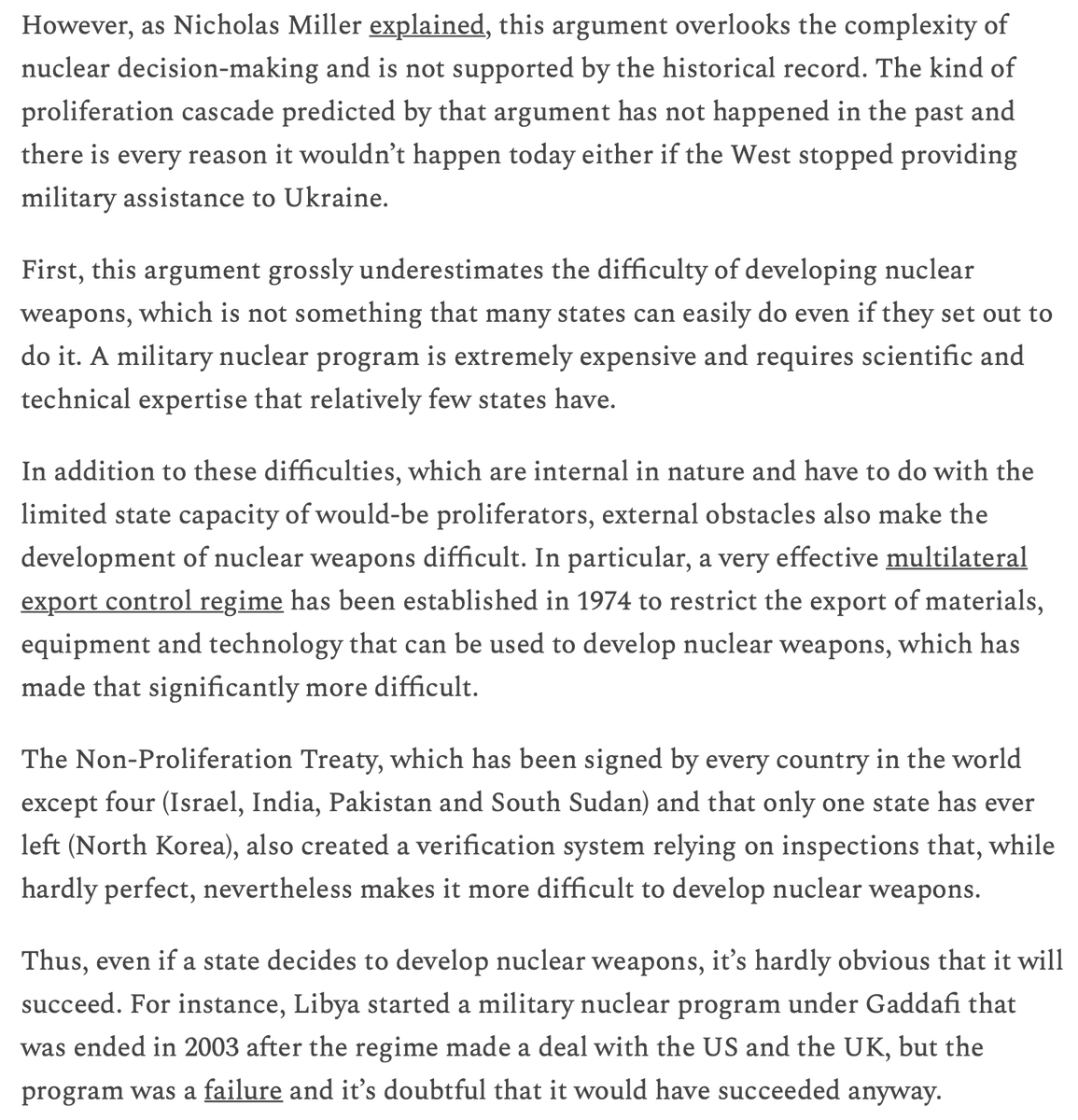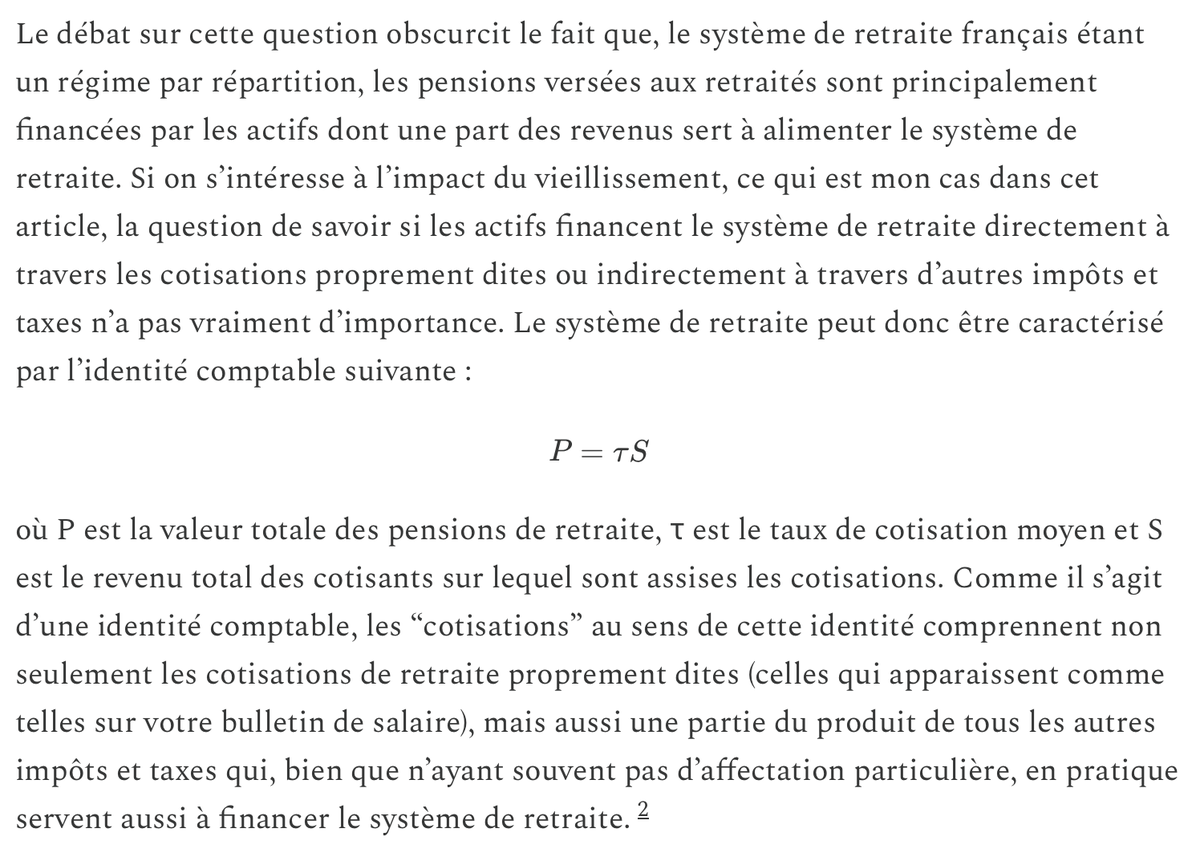People argue that we should provide military assistance to Ukraine for selfish reasons, because it's in the West's interest. In this essay, I go over the main arguments in favor of that view and conclude they are not convincing 🧵 philippelemoine.substack.com/p/the-case-aga…
The most popular argument for the view that it's in the West's interest to provide military assistance to Kiev is probably that, unless we help Ukraine win, Russia will attack NATO's eastern flank next, but I argue that it's a preposterous claim. 

People argue that, since most people didn't believe Putin would attack Ukraine, we can't dismiss that Russia might attack the Baltics next if we didn't help Ukraine don't understand that Ukraine is and always was a special case. 



The mere fact that such a view can be publicly entertained without fear of ridicule illustrates the pathologies of the public debate on that issue. 



I argue that people make this argument because they misunderstand the events that led to the war. There is no Russian grand strategy, the invasion is just the result of one improvisation after another. 

Even if this had been Putin's plan, he still wouldn't have been in a position to execute it even if we hadn't provided military assistance to Ukraine, because although people talk as if subjugating a country of 44 million were easy it's far from being true. 







Paradoxically, despite being the most anti-Russian and pro-Ukrainian people in the West, the people who make that argument both overestimate the Russians and underestimate the Ukrainians. 

Another commonly heard argument is that, if the West refrains from providing military assistance to Ukraine because we're afraid of Russia's nuclear arsenal, it will lead to proliferation because non-nuclear states will take notice of that and seek to acquire weapons. 

However, as I argue in this section, this argument is unconvincing because it overlooks the complexities of nuclear decision-making. 



In fact, not only is the argument that providing military assistance to Ukraine will make proliferation more likely bad, but in fact the opposite is true because the non-proliferation regime crucially rests on cooperation with Russia that such a policy puts at risk. 

Another popular argument is that providing military assistance to Ukraine is a way to get rid of a rival on the cheap, but this argument is also confused, starting with the fact that again Russia was never in a position to challenge to the US hegemony in the first place. 

Moreover, while the direct cost of military assistance to Ukraine is small (at least for now, but Russia hasn't been defeated yet and there is no saying how long it will take if we even do), it has significant indirect costs that the people who make that argument overlook.
First, it's quickly emptying inventories and putting military production under a lot of strain, which despite plans to expand capacities may get worse and reduce the West's military preparedness for years if the war drags on. 



Providing military assistance to Ukraine also has significant indirect economic costs, especially for Europe, which will also get worse as the war continues. 



Moreover, while providing military assistance to Ukraine will probably reduce Russia's *ability* to harm the West's interests, this will be more than compensated by the fact that it will increase its *willingness* to do so. 



Indeed, Russia may be too weak to challenge the West's hegemony, but it has considerable spoiling power and people who think it's already as bad as it can be may soon find out how wrong they are. As I already noted, this policy will even damage the non-proliferation regime.
Providing military assistance to Ukraine will also push Russia even closer to China, which unlike Russia actually could challenge the US hegemony, if that's something you care about. 

Finally, while a nuclear escalation is fortunately very unlikely, it's still a risk as long as we provide military assistance to Ukraine and, other things being equal, the West clearly has an interest not to take that risk. 



Another very common argument is that, by providing military assistance to Ukraine, the West is deterring future wars of aggression, but this argument is deeply flawed and overlooks complexities in decision-making on matters of war and peace. 

First, the number of states that might be deterred by this police is very low, because at any given time few states have the means and inclination to invade their neighbors and even less have reasons to infer much from the West's policy on Ukraine. 



It could be argued that, if that is true, it's largely because of the norm against wars of territorial aggrandizement and that Western military assistance to Ukraine is necessary to sustain that norm, but I argue that this claim is ad hoc and not very plausible. 





Moreover, even if the West hadn't provided military assistance to Ukraine, it's not as if Russia would have benefited from the invasion, because again it would still have been a disaster for Russia. 

Another difference with the case of criminal punishment in the domestic sphere is that, whereas criminals ordinarily can't inflict significant harm to the state that punishes them, the same can't be said of states and this complicates the cost-benefit calculus for both sides. 



Finally, while providing military assistance to Ukraine arguably makes other potential aggressors less likely to go through with their plans *other things being equal*, offering this kind of support to Ukraine makes other things *not* equal. 

The last argument I examine is the argument that not providing military assistance to Ukraine would undermine NATO's and in particular the US credibility. It's not clear what the argument is exactly, but I go over several possible interpretations and find none of them convincing. 

The first interpretation I consider is that, had the West not provided military assistance to Ukraine, it would have undermined the credibility of NATO's article 5 in the eyes of potential aggressors, but I argue that it's not persuasive. 

Another interpretation of the credibility argument is that it would have undermine the credibility of NATO's article 5, not in the eyes of would-be aggressors, but in the eyes of member states, but I argue that it's not persuasive either. 



Yet another interpretation is that not providing military assistance to Ukraine would have undermined the credibility of NATO's out-of-area interventions, but I argue that it's no more convincing. 



The last interpretation of the argument I consider is the idea that, unless the US and its allies provide military assistance to Ukraine, the credibility of the US as the "world's policeman" will be critically undermined. 

But this version of the credibility argument is also unconvincing. First, as the previous interpretation, it effectively functions as a self-fulfilling prophecy since the NATO's and the US credibility is only on the line because we provide military assistance in the first place. 

But more importantly, the idea that if Russia wins now that the US and its allies have committed themselves to Ukraine's defense it will change how countries interact with the US is not convincing, because it wouldn't affect the objective factors underlying the US hegemony. 

Hawks love to bring up credibility because it allows them to defend virtually any policy without having to make a real argument. This has always been a recipe for the sunk cost fallacy and I argue that this case is no different. 

In the conclusion, I argue that committing to Ukraine's defense is an ill-conceived policy, that was taken not because it was in our interest but because we acted without carefully deliberating and started down a slippery slope without even noticing. 





The claim that it’s in the West’s interest to provide military assistance to Ukraine is just a noble lie supporters of that policy came up with to convince people, starting with themselves, that it was the right thing to do. It would be preferable if they admitted this. 

Finally, I argue that even if you disagree with my conclusions, you ask yourself how sure you can be that you are right, given the toxic intellectual environment that supporters of Western military assistance to Ukraine have created. 



Anyway, thanks if you have read this far and please read the whole thing, there is more that I didn't cover in this thread and some of your questions/objections may be answered in the essay.
P. S. I've added a note at the end on a point that several people brought up, because it seemed worth saying a word about it. Other than that, I feel like I have said my piece and that it's best to let things stand, because otherwise it will never end. 

Oops, @pranesh is right, this was a typo.
https://twitter.com/pranesh/status/1630636789600796682
I just noticed another typo. The last sentence should read "decrease", not "increase", of course.
https://twitter.com/phl43/status/1630591802641088512
• • •
Missing some Tweet in this thread? You can try to
force a refresh














